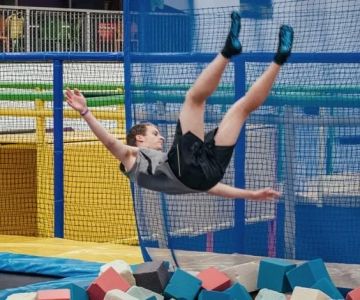- 1-understanding-dizziness-while-jumping
- 2-causes-of-dizziness-during-jumping
- 3-practical-tips-to-prevent-dizziness
- 4-importance-of-pace-and-breathing
- 5-when-to-seek-medical-advice
1. Understanding Dizziness While Jumping
Feeling dizzy during or after jumping on a trampoline or any similar activity can be alarming. Dizziness often results from a temporary disruption in your body’s balance system or blood flow. Understanding the underlying reasons helps you take the right precautions to enjoy jumping safely and avoid discomfort.
2. Causes of Dizziness During Jumping
Several factors contribute to dizziness when jumping:
2.1 Inner Ear Disruption: Your inner ear controls balance, and rapid movements or spins can confuse it, leading to dizziness.
2.2 Dehydration: Lack of sufficient fluids reduces blood volume and affects oxygen flow to the brain.
2.3 Low Blood Sugar: Jumping on an empty stomach may cause light-headedness.
2.4 Overexertion: Excessive or intense jumping without breaks strains your body and can trigger dizziness.
3. Practical Tips to Prevent Dizziness
Implement these steps to avoid getting dizzy while jumping:
3.1 Stay Hydrated: Drink plenty of water before and after your jump session to maintain optimal hydration.
3.2 Warm Up Gradually: Begin with slow, gentle jumps to let your body adjust.
3.3 Limit Spinning Movements: Reduce rapid spins or flips which can overwhelm your balance system.
3.4 Eat Lightly: Have a small snack before jumping to keep your blood sugar stable.
3.5 Take Frequent Breaks: Rest between sessions to prevent fatigue and allow your body to recover.
4. Importance of Pace and Breathing
Maintaining a steady pace and controlled breathing can greatly reduce dizziness risks. Avoid holding your breath during jumps, as this can decrease oxygen delivery. Focus on rhythmic breathing and listen to your body’s signals to pace yourself effectively.
5. When to Seek Medical Advice
If dizziness persists despite following safety tips or is accompanied by symptoms like fainting, vision changes, or severe headaches, consult a healthcare professional promptly. Persistent dizziness might indicate an underlying condition needing evaluation.
For high-quality trampolines and expert advice on safe jumping techniques, visit Trampoline Zone. Their products and resources can help you enjoy your jumping experience while minimizing risks.







 Pump It Up Lake Forest Kids Birthday and More4.0 (280 reviews)
Pump It Up Lake Forest Kids Birthday and More4.0 (280 reviews) Urban Air Trampoline and Adventure Park4.0 (349 reviews)
Urban Air Trampoline and Adventure Park4.0 (349 reviews) Church Street Plaza4.0 (731 reviews)
Church Street Plaza4.0 (731 reviews) Fun City Adventure Park3.0 (162 reviews)
Fun City Adventure Park3.0 (162 reviews) Riki Tiki's Indoor PlayGround4.0 (35 reviews)
Riki Tiki's Indoor PlayGround4.0 (35 reviews) Urban Youth Park - South Bay4.0 (107 reviews)
Urban Youth Park - South Bay4.0 (107 reviews) Are Trampoline Parks Safe for Kids? Essential Guide for U.S. Parents
Are Trampoline Parks Safe for Kids? Essential Guide for U.S. Parents How Often Should You Replace Trampoline Springs? Tips for Proper Maintenance
How Often Should You Replace Trampoline Springs? Tips for Proper Maintenance How Much Is a Trampoline? A Detailed Guide to Trampoline Costs and Buying Tips
How Much Is a Trampoline? A Detailed Guide to Trampoline Costs and Buying Tips Bounce Techniques for Stronger Legs: Effective Exercises and Tips
Bounce Techniques for Stronger Legs: Effective Exercises and Tips Essential Music Gear for Trampoline Dance: Complete Guide
Essential Music Gear for Trampoline Dance: Complete Guide Fun STEM Experiments Using Trampolines to Spark Curiosity and Learning
Fun STEM Experiments Using Trampolines to Spark Curiosity and Learning